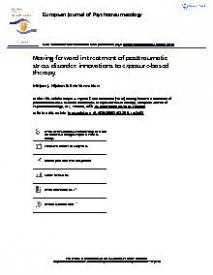Moving forward in treatment of posttraumatic stress disorder : innovations to exposure-based therapy
The field of treatment of posttraumatic stress disorder (PTSD) has been a pacesetter for the changing face of psychotherapy, as is illustrated in the introduction of Virtual Reality Exposure Therapy. This paper outlines a novel approach that builds on a cognitive-motor interaction in a virtual interactive environment. It is based on the theory of memory reconsolidation and the embodiment of cognition.
The framework we envision allows the patient to 'step into the past' by using forward motion as an essential ingredient to augment the impact of exposure to traumatic events. The behavioural response of approaching that is the exact opposite from the avoidance usually applied by patients and the enhancement of divergent thinking are the most prominent hypothesized mechanisms of action. This can contribute to strengthening of personal efficacy and self-reflection that is generated by high emotional engagement, as well as a sense of accomplishment and enhanced recovery as illustrated by a clinical case example. We argue that innovations with personalized virtual reality and motion need to be further investigated and implemented in current therapy settings.
In: European Journal of Psychotraumatology, ISSN 2000-8198 ; eISSN 2000-8066 | 9 | [1] | 1458568
https://doi.org/10.1080/20008198.2018.1458568


